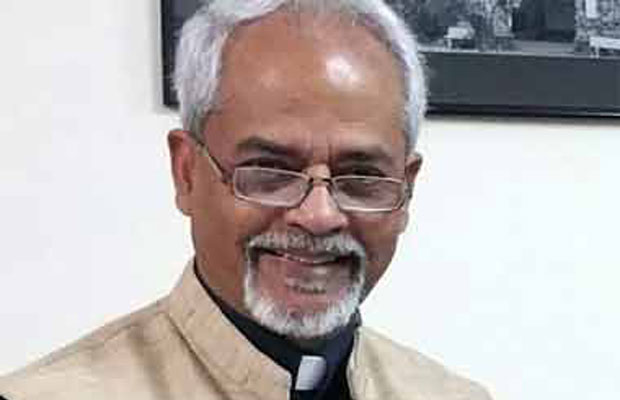By ValsonThampu
Jesus condemned the then church –Judaism- for the hypocrisy of its priesthood. A major ingredient of this hypocrisy is the political abuse of morality and religious rules. Morality, in the hands of hypocrites, becomes a means of control. Moral ideals imposed on others will not be acceptable to oneself.
It is high time that Dalit Christians realized that morality, as against the Law of God, is a class matter. Barring the mentally retarded, everyone knows that what any establishment preaches and prescribes is meant, primarily, to protect the vested interests of its dominant group. What is not acceptable to it will be side-lined.
Consider the idea of faithfulness promoted by the caste-dominated Church. It is essentially loyalty to the hierarchy. And what is this hierarchy? Is it not the nucleus of elite interests? As a case in point, consider the priestly vows. Jesus did not prescribe poverty, chastity and obedience, in the sense in which they are imposed on priests today.
(Jesus did not set any store by the priesthood. He did not appoint any. He only chose apostles and mandated them to make disciples. Priests are wholly absent from Jesus’ scheme of things.)
From where did the Church get these ideas? Well, from the Greeks. But, not quite! The Greeks maintained that philosophers ought to maintain a discipline commensurate to their high calling. It had three ingredients: poverty, chastity and humility. See how cunningly the church modified this! Retained poverty, but interpreted poverty in a skewed fashion. To the Greeks, poverty meant, first and foremost, the renunciation of power. In the church today, those who take the vow of poverty see it as a license for unlimited power.
To the Greeks, chastity meant purity in relationships. The church turned it into celibacy. I do not wish to go into the reasons for this. Suffices it to say that this has taken us to an absurd state in which a priest needs to be celibate, but not chaste! That is why the allegation of a bishop raping a nun leaves most Christians indifferent. (By the way, nuns are Dalits in the male-dominated patriarchal church, as Pope Francis said two years ago.)
As for humility, the church degraded it into obedience! Humility is humility before God, not self-abasement before men. The church has no use for such humility. What suits its interests most is obedience to the authority of man. This has created a culture of sycophancy and authoritarianism in the church: a shocking mockery of all that Jesus stood for.
You might wonder what all this has to do with the politics of morality? What I have pointed out so far should serve to illustrate that the church has a special knack for formatting and de-formatting anything to suit its vested interests.
As a rule, a church that is economically deprived will be mindful of moral principles. An affluent church cares not a straw for them. The prime obsession of such a church is with rituals and liturgies. That is because virtually the only concern that people of means and privilege have is to protect and preserve their advantages. The essence of their religiosity is anxiety about the possibility of vicissitudes. Adverse changes can be averted by keeping God well-humoured. The best way to do that is via rites and rituals. At least, the priests assume that to be the case.
But this is not the Dalit concern. The Good News for the Dalits is that radical change is possible. But this is bad news for Christians of privilege. The Good News that Jesus came to preach to the poor (Mtt.5:3) is that the God of history is the God of liberation. Jesus came to set the captives free. Do you think that this is good news for caste Christians vis-à-vis Dalits? Really? Have you forgotten how traumatised affluent Christians in the Southern states in the US were –the so-called Bible belt- when slavery was abolished? Even today, do Christians take kindly to the idea of caste Christians and Dalit Christians being equal members of the same spiritual family?
The morality acceptable to Christians of privilege is necessarily pro-status-quo-ist. Most of them are aimed at keeping the body in fetters? Why? Well, because the Dalits have only one resource: their bodies. Moral norms meant to keep the body under bit and bridle are distinguished from the moral demands pertaining to purity in relationships, including man-woman relationships. The Upper-caste way of life, including Christians in this socio-economic bracket, is characterised by sexual promiscuity and indulgence. This is fairly well-known. But nobody spends sleepless nights because of it. They will all go to heaven, as priests assure them before death and reassure their relatives after their death, because God is on the side of the successful; for, after all, is not prosperity a sign of divine favour?
In contrast, consider the core teachings of Jesus. In particular, the New Commandment, that we should love one another. Do you think this is acceptable to Christians? There are two categories of Christians in our midst. Some are entitled to be loved; others are obliged to love. Do Dalit Christians merit love? Have you ever sought an answer to this question? Do a survey among Dalit Christians and find out how many of them feel they are loved and valued in the Christian fold? The findings could be edifying.
Dalit Christians need to be clear on this one thing. Every moral demand, every religious duty, every cultural ideal meant to perpetuate the status quo is, truth be told, diabolic. At the very least, they are against the life and teachings of Jesus Christ. He came to inaugurate the Kingdom of God, which represents a radical alternative to the man-made systems in vogue. He came to transform lives. Transformation is the key to liberation. Both involve radical changes. A church that resists change is not of God. It is a Jesus-denying Church. It is a hindrance to the mission of Jesus, ‘to set the captives free’.
The agenda of liberation is welcome to Dalits. What are the rich and the well-to-do to be liberated from, do you think? From their wealth? Yes, that’s it. But do you think it is acceptable to Christians? The answer to this is already given in the Gospel of St. Matthew. Remember the rich young man. Did Jesus seek to liberate him from his abject dependence on wealth? What happened? Do you think we have moved an inch forward from there in two thousand years?
Jesus was inviting the rich young man to be a Dalit; for he was one. The world benefits only from Dalits. The pity is that Dalits themselves do not believe in this. They believe that it suffices to have access to the crumbs that fall from the master’s table’. So long as Dalits do not outgrow this slavish mentality they will not experience authentic Christianity or wholesome humanity.
Dalits must renounce the luxury of being accommodated on the margins of elite, hypocritical Christianity. Their awesome duty, as I pointed out in an earlier piece, is to seek and find the true church, of which Jesus is the head. That church will enunciate a new theology of the body. How can there be a sacrament without the body? Especially the Dalit body? What is the function of the sacrament? Is it not to manifest the hidden? The hidden reality is that society as a whole subsists on the Dalit body. Upper-class sophistication derives sustenance from its labour, but scorns and despises the smell and sweat of it. Not only that. The Dalit body must be kept in fetters; just in case it spins out of control and begins to de-stabilize the establishment.
The Dalit truth is that there is no liberation without the sanctity of this holy subversion. Visages of hypocrisy need to be torn down, if a new heaven and a new earth are to become visible at any time in history. A Dalit theology of holy subversion should be the foremost agenda of our times. There is no higher legacy we can hand down to the coming generations.
(ValsonThampu is a former principal of St. Stephen’s College, Delhi.The opinions expressed in this article are those of the author and do not necessarily reflect the official editorial position of DALIT CRISTIAN DIGEST.




















































Wonderful article. The whole church should become dalit. Dalitness is the Church. All christians should work towards this.